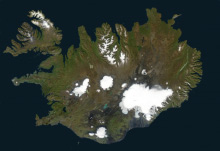Crowdsourcing of the new constitution of Iceland
 The committee on drafting the new constitution of Iceland appealed to the citizens to help in writing the document. They opened a page on Facebook , where everyone can express their opinion on the draft document, and these changes will be made to the text. Project news is broadcast via Twitter , Youtube and Flickr .
The committee on drafting the new constitution of Iceland appealed to the citizens to help in writing the document. They opened a page on Facebook , where everyone can express their opinion on the draft document, and these changes will be made to the text. Project news is broadcast via Twitter , Youtube and Flickr .Thus, the new Icelandic Constitution will be the first in the world, drawn up with the help of crowdsourcing, that is, the collective efforts of the citizens of the country.
It is noteworthy that they do not invite people to write comments on their state website, but integrate the legislative process into the structure of popular social networks like Facebook, because people are so much more comfortable. The result did not keep waiting for a long time - the Facebook page is already full of comments not only from Icelanders, but also from citizens of other countries who also want to help.
Of course, not everyone makes a useful contribution, there is a lot of trolling on social media pages, but moderators try to keep the conversation within the framework of constructive polemics. State administrators on Facebook comment on some controversial statements and clarify legal issues.
')
The current Icelandic constitution is almost completely copied from the Danish, because Iceland gained independence from Denmark relatively recently - in 1944. Only cosmetic changes were made to the text of the document (the “king” was replaced with the “president”, etc.). Of course, the two countries are very different from each other, which should be reflected in the constitution. For example, in Iceland there is a very small population (320 thousand people) with inexhaustible sources of geothermal energy. Thus, Iceland can easily afford to include in the constitution a large list of social guarantees. In 2007, the UN declared Iceland the best country to live in the world.
Not quite on topic:
Science fiction writer David Brin proposes to simplify the US tax code (10,000 pages) with the help of mathematical modeling . By optimizing the parameters of the system, it is possible to reduce the number of taxes by at least 70%, while keeping the amount of tax payments for each payer almost unchanged. For large-scale simulation, you can use a supercomputer or run a distributed computing project following the example of Folding @ Home.
Source: https://habr.com/ru/post/121883/
All Articles